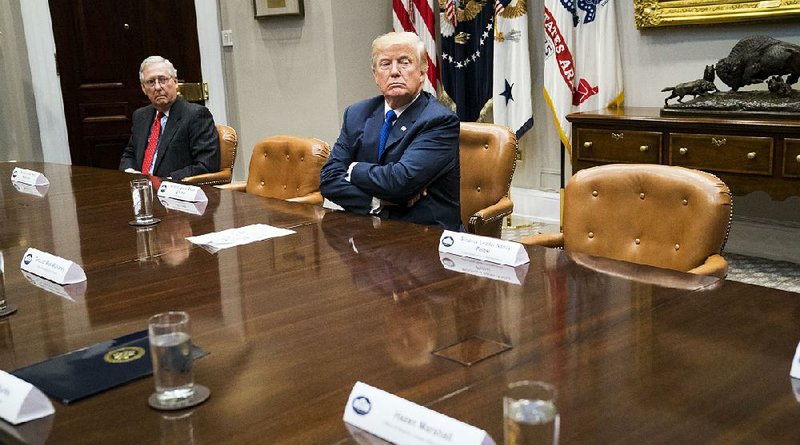WASHINGTON -- Congress' top Democrats backed out of a scheduled meeting with President Donald Trump on Tuesday after he attacked them on Twitter, casting doubt on the prospects for a quick agreement to avert a government shutdown at the end of next week.
Also Tuesday, Republicans advanced their signature tax overhaul through the Senate Budget Committee.
But the most crucial impending deadline concerns legislation that would keep the government open and that, because of add-ons to the measure, would likely settle complex issues regarding immigration and health care.
Failure to act in the coming days could, in addition to causing a partial shutdown of government operations, jeopardize health care services for 9 million children and further complicate the fate of hundreds of thousands of illegal aliens brought to the country as children who could start facing deportation in early March.
"We have a lot differences," Trump said in the White House's Roosevelt Room, flanked by two empty chairs meant for House Minority Leader Nancy Pelosi, D-Calif., and Senate Minority Leader Charles Schumer, D-N.Y., calling Democrats weak on crime, immigration and the military. Asked about the possibility of a government shutdown this month, the president said, "If that happens, I would absolutely blame the Democrats."
Tensions began rising early Tuesday after Trump tweeted ahead of the scheduled meeting that Schumer and Pelosi "want illegal immigrants flooding into our Country unchecked, are weak on Crime and want to substantially RAISE Taxes. I don't see a deal!"
Democratic aides on Capitol Hill spotted the president's tweet and, within hours, Schumer and Pelosi agreed to skip the meeting, saying they would rather negotiate with Senate Majority Leader Mitch McConnell, R-Ky., and House Speaker Paul Ryan, R-Wis., as they did in the spring to pass a similar spending plan.
The breakdown in talks between Trump and Democrats will put more pressure on McConnell and Ryan, who both attended the White House meeting, to find a way forward on spending negotiations while they also race to wield their majorities to try to pass their sweeping tax bill this month.
[PRESIDENT TRUMP: Timeline, appointments, executive orders + guide to actions in first 200 days]
After a rocky first year with no major legislative achievements, Republicans have a great deal at risk as the year winds down and the 2018 midterm election campaign ramps up.
While Republicans have control of Washington, GOP leaders have conceded that they will probably need Democratic votes to help pass spending bills because of potential opposition from conservatives in the House and because Senate Democrats can filibuster spending legislation.
"We need 60 votes in the Senate to close off debate and so, with 52 Republicans, we can't do it by ourselves," said Sen. John Cornyn, R-Texas, McConnell's top deputy.
Schumer and Pelosi hope to use this leverage to insist on adding policy issues -- such as the immigration and children's health care issues -- to win their support for the year-end funding bill.
Trump "now knows that his verbal abuse will no longer be tolerated," Pelosi wrote on Twitter. "His empty chair photo opp showed he's more interested in stunts than in addressing the needs of the American people. Poor Ryan and McConnell relegated to props. Sad!"
Schumer also chimed in on Twitter. "It's time to stop tweeting and start leading," he wrote.
The two Republican leaders, meanwhile, faulted Democrats for "antics" that were putting government and military operations at risk.
McConnell said at the White House, "I think the Democratic leaders in the House and Senate need to understand the way the government works, and the administration has to be a part of the ultimate negotiation over what the spending level is going to be for the next year."
White House Press Secretary Sarah Huckabee Sanders in a statement said the Democrats' move to call off the meeting was "disappointing."
"The President's invitation to the Democrat leaders still stands and he encourages them to put aside their pettiness, stop the political grandstanding, show up and get to work. These issues are too important," she wrote.
Even before Tuesday's standoff, Republican and Democratic aides predicted that leaders were unlikely to agree on setting new spending levels this week, meaning Congress is likely to pass a short-term spending bill by Dec. 8, when current funding expires, that would postpone negotiations until just before Christmas.
Currently, Congress may spend no more than $549 billion for defense programs and $516 billion for nondefense programs next year, a cut from current levels. But the Trump administration and defense hawks in both parties want to boost Pentagon spending to more than $600 billion, while Democrats are demanding a dollar-for-dollar increase in domestic spending.
Trump has explicitly threatened a government shutdown twice this year.
"If it happens it's going to be over illegals pouring into the country, crime pouring into the country, no border wall, which everyone wants," he said Tuesday.
He added that North Korea's launch of a ballistic missile this morning should prompt Democrats to renew negotiations over the defense portions of spending legislation.
"But probably they won't because nothing to them is important other than raising taxes," Trump said.
Senate tax bill
In a party-line 12-11 vote, Republicans on the Senate Budget Committee managed to advance the tax measure to the full Senate as a pair of wavering Republicans -- Wisconsin's Ron Johnson and Tennessee's Bob Corker -- fell into line, at least for the moment.
Trump weighed in on Twitter Tuesday night. "Great day for Tax Cuts and the Republican Party. But the biggest Winner will be our great Country!"
Also Tuesday, moderate Sen. Susan Collins of Maine said it was a "fair assumption" that she was likelier to support the bill after saying Trump agreed to make property taxes up to $10,000 deductible instead of eliminating that deduction entirely.
But the fate of the legislation remained uncertain as it headed toward debate by the full Senate. For the same reason the spending bill will be tough to pass, GOP leaders can afford just two defectors to pass the tax bill, and a half-dozen or more in their party have said they were uncommitted to it. Some have said they want bigger tax breaks for businesses while others take issue with the $1.4 trillion -- or more -- that the measure is projected to add to the national debt over the next decade.
"It's a challenging exercise," McConnell conceded. He compared it to "sitting there with a Rubik's Cube and trying to get to 50" votes, a tie that Vice President Mike Pence would break.
Corker, who's all but broken with Trump over the president's behavior in office, is among a handful of Republicans uneasy over the mountains of red ink the tax measure is expected to produce. He said he was encouraged by discussions with the White House and party leaders to include a mechanism -- details still unknown -- to automatically trigger tax increases if specified, annual economic growth targets aren't met.
"I think we're getting to a very good place on the deficit issue," Corker said.
But other Republicans are wary of backing legislation that would hold the hammer of potential future tax increases over voters' heads.
"I am not going to vote to automatically implement tax increases on the American people. If I do that, consider me drunk," said Sen. John Kennedy of Louisiana.
Collins said she'd also won agreement that before completing the tax measure, Congress would approve legislation restoring federal payments to health insurers that Trump scuttled last month. That bill has had bipartisan support, but it's unclear if Democrats would back it amid partisan battling over the tax bill.
Information for this article was contributed by Ed O'Keefe, Sean Sullivan, Josh Dawsey and John Wagner of The Washington Post; by Alan Fram, Andrew Taylor, Matthew Daly, Kevin Freking and Stephen Ohlemacher of The Associated Press; and by Toluse Olorunnipa, Laura Litvan and Jennifer Epstein of Bloomberg News.
A Section on 11/29/2017



